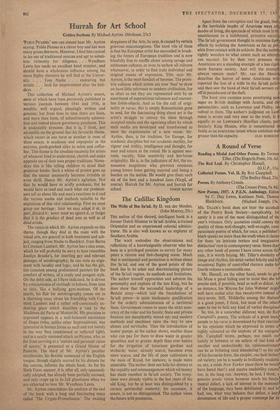The Cadillac Kingdom
The Wells of Ibn Sa'ud. By D. van der Meulen.
(John Murray, 25s.) THE author of this shrewd, intelligent book is a former Dutch Minister to Sa'udi Arabia, a trained Orientalist and an experienced colonial adminis- trator. He is also well known as an explorer of Southern Arabia.
The work embodies the observations and reflections of a knowledgeable observer who has been in a privileged position to survey for many years a remote and fast-changing scene. Much that is sentimental and pernicious is written about lbn Sa'ud, and one of the good points of this book lies in its sober and discriminating picture of the Sa'udi regime, its methods and limitations. The author himself appreciates and admires the personality and exploits of the late King, but he does show that the successful leadership of a Beduin army—which laid the foundations of Sa'udi power—is quite inadequate qualification for the orderly administration of a territorial State. Government comes to mean the strict auto- cracy of the ruler and his family; State and private finances are inexplicably mixed up; and modern methods and machines open the way to new abuses and servitudes. Thus the introduction of motor pumps, as the author shows, enables those who can pay for them to draw water in greater quantities and at greater depth than ever before for the irrigation of luxurious gardens and orchards; water, already scarce, becomes even more scarce, and the life of poor cultivators in the oasis of Riyad, for instance, is made more miserable. The author does not hide his dismay at the cupidity and mismanagement which oil money has made manifest in Sa'udi society. The symp- toms were already visible in the last years of the old King, but he at least was distinguished by a certain patriarchal austerity; his successor, it seems, is not so distinguished. The author views the future with pessimism. Apart from the corruption and the greed, the! is the inevitable impact of American ways an modes of living, the spectacle of which must brin unsettlement to a hidebound, primitive societ The Sa'udi government thought to minimise then effects by isolating the Americans as far as Pol Bible from contact with its subjects. But the authc e rightly wonders to what extent such an attemi can succeed; for by their very presence tt Americans arc a standing example of a less rigii more humane society. And will the exampl always remain mute? Mr. van der Meule describes the horror of some Americans wh reported the loss of a trifle to the Sa'udi polic and then saw the hand of their Sa'udi servant ci off in punishment of the theft.
The book also contains some penetrating pa, sages on British dealings with Arabia, and d personalities, such as Lawrence and Philby, iI volved in them. The author's judgment on Lav rence is severe and very near to the truth. It equally so on Lawrence's Sharifian clients, pa titularly King Husain, who is remembered i Jedda as an avaricious tyrant whose ambition wi greater than his capacity. ELIE KEDOUR]


























 Previous page
Previous page